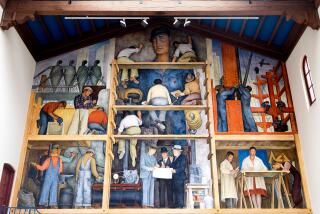CRENSHAW : Arts School Adding Technology Center
- Share via
On the heels of a benefit concert for a student scholarship fund, the Institute of Musical Arts is pledging to take its performance to a higher level.
The nonprofit arts school and recording complex at 3210 W. 54th St. has already begun making good on that promise: Construction is under way on a Technology Center that will offer music and video production, video mixing and capacity for film scoring.
Institute founder and director Randy Woodard said he expects to raise enough funds to cover the roughly $150,000 in improvements but will pay the costs out of his pocket for now. “We’re looking to become a total communications center,” said Woodard, a producer and musician who took over the center with partner John Osborne. “We don’t want to cut corners.”
The institute has also steadily built its arts program, which offers low-cost instruction in music and music production to youth as well as vocal, musical and poetry workshops for adults.
Benefit concerts such as the one recently held at the Glam Slam club Downtown strive to raise money to cover instruction costs, though Woodard said the financial going has been slow at times.
Music school director Michael Harris said that though he barely gets paid for teaching, the rewards make the experience more than worthwhile.
“We do all this for the young people,” said Harris, a trumpeter who has recorded with such artists as Phil Collins. “It’s a great high to teach kids to read music, to make sure they understand that basic technical aspect of the business. The bottom line is, if you can’t read music, you can’t do studio work. You won’t be hired.”
Built in 1922 as a music performance hall, the Institute of Musical Art found new life as a top recording studio in the 1960s and ‘70s, then languished until Woodard took an interest. In its latest incarnation, Woodard and his staff say their insistence on building a music technical center will best serve performers and producers alike.
“You have to look at what’s behind the scenes, the whole picture,” Woodard said. “If we invest in the equipment, we can do things for a longer period of time. We don’t have to keep reinventing the wheel. If you’re not deep enough on the technical side, if you only perform, then you’re (limited). We have to ensure that there are no limitations to what we can do.”
More to Read
The biggest entertainment stories
Get our big stories about Hollywood, film, television, music, arts, culture and more right in your inbox as soon as they publish.
You may occasionally receive promotional content from the Los Angeles Times.










